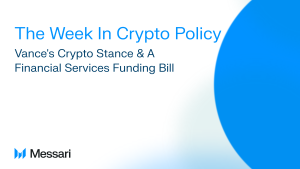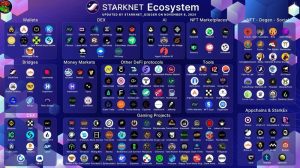Key Insights
- DeFi protocols face two key challenges to decentralizing governance power: the Sybil attack and low token claims.
- SafeDAO has adopted the retroactive airdrop system and unique solutions such as the Vested Airdrop, to address the Sybil attack.
- Only 26.7% of eligible users claim their SAFE Airdrop. This low claim rate can be attributed to inadequate communication, slow governance processes, and avoidance of taxable events by some claimants.
- The SafeDAO serves as a reference for robust governance, and there are suggestions to expand the pool of token holders to further improve decentralization.
Introduction
The decentralization of governance power presents two significant challenges for protocols: Sybil attacks and redeeming airdrops.
A Sybil attack is where individuals create multiple addresses to receive more tokens than they are entitled to. Some protocols have adopted the retroactive airdrop system introduced by Uniswap’s UNI airdrop to address this. This allows protocols to reward early active users and contributors to the protocol while resisting attempts by individuals to game the token distribution system. Protocols that have adopted this system and improved on it include dYdX, ENS, Optimism, and Saddle, while SafeDAO has tweaked its solution with a Vested Airdrop and initially non-transferable tokens.
The second challenge is ensuring eligible claimants redeem their airdrops. For instance, despite a well-executed airdrop in which users could claim a portion of the allocated 5% of the SAFE token supply (of which 2.5% is vested allocation), only 35.6% of the allotted 50 million tokens were redeemed. This resulted in an imbalance in voting power in SafeDAO, which impacted the protocol’s decentralization goals. Similar cases have been observed in other protocols, such as ENS and SushiDAO, which had to claw back its unclaimed tokens. In the case of SafeDAO, this has led to 26.7% of eligible users having an outsized impact on the protocol’s direction through their voting on the first four Safe Ecosystem Proposals (SEPs). The latest proposal, SEP 5, aims to address this imbalance by correcting the token distribution.
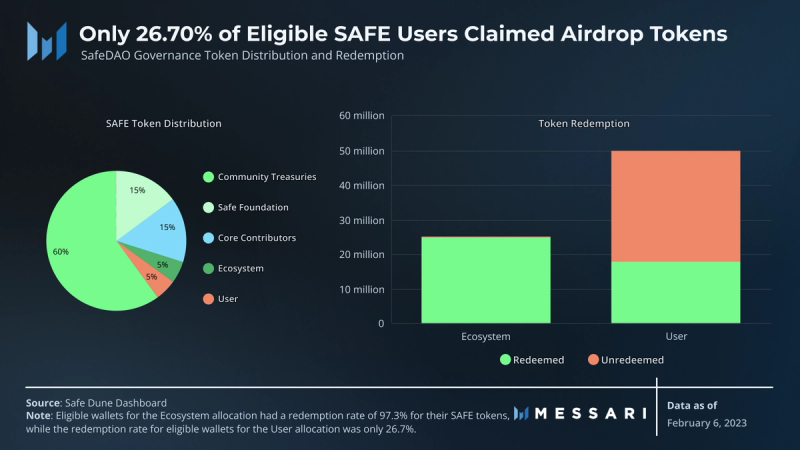
If all had gone as planned, the data analysis for token redemption reveals that 0.5% of token recipients would hold 7.6% of the voting power from airdropped tokens, and 60% of recipients would have control over 18.7% of SafeDAO’s voting power. Meanwhile, a larger group of 37.26% eligible airdrop recipients hold the majority of the voting power, 57.58%.
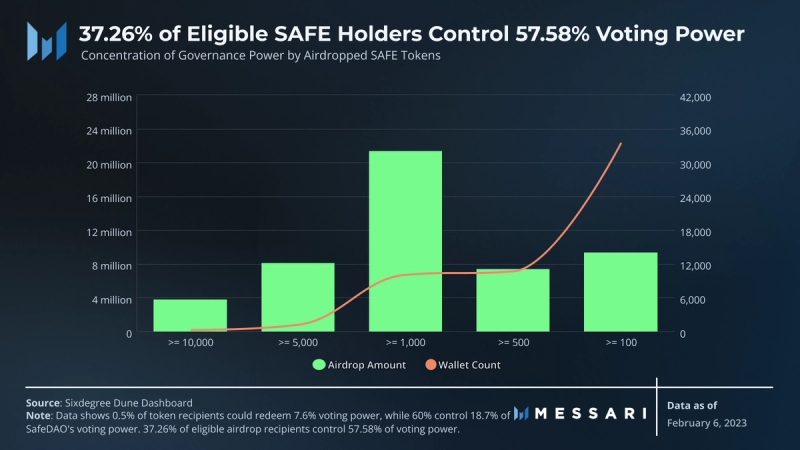
Sybil attackers can harm the token market by selling their claimed tokens, which leads to a price drop. They can also manipulate governance decisions in a DAO with low participation. However, SafeDAO has highly active governance, as evinced by the engagement of its forum participants. Additionally, the SAFE token’s initial non-transferability (until the DAO meets certain milestones) dissuades these possibilities.
Conversely, unclaimed airdropped tokens significantly impact voting power decentralization efforts. It is essential to determine the reasons behind the high amount of unclaimed tokens to improve the design and timing of token airdrops and encourage participation and usage-based governance. SafeDAO, with its active and robust governance, serves as a valuable reference in these scenarios.
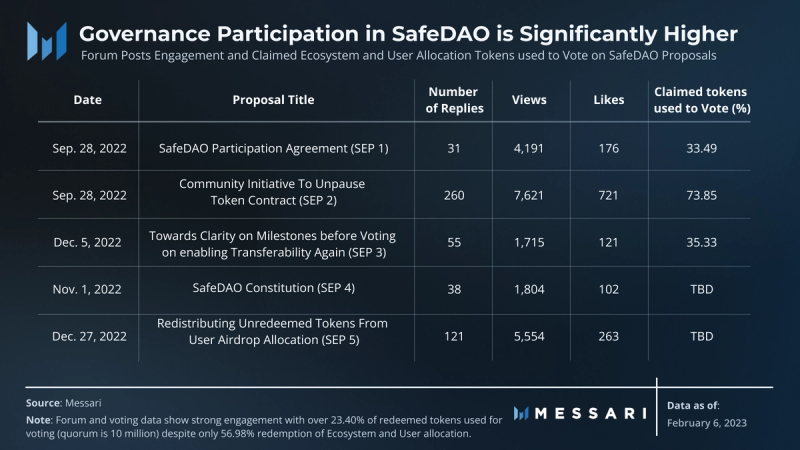
Proposed SEP 5 for Revised Token Redistribution
SEP 5 aims to resolve the imbalance in the governance power distribution among Safe protocol users. The two options to allocate unclaimed tokens are:
- Proportionally distribute the unclaimed tokens to those who have already redeemed their allocated tokens.
- Consider alternative allocation methods, such as extending the claim period for recipients who missed the redemption deadline.
The tokens will have a four-year vesting period and must be redeemed by June 1, 2023. SafeDAO’s Snapshot voting system only allows for a single-choice voting system, the simple voting method where token holders select one option from several choices, and the option with the most vote wins. This means that the choices for this proposal include different combinations of both allocations and the chance to abstain or reject the proposal.
Reasons for the Unclaimed Tokens
Airdrop recipients may not have claimed their tokens for several reasons, such as poor communication of the claim period and deadline, slow governance processes for DAO-owned safes, and lack of interest or avoidance of taxable events. To ensure fair distribution of governance power, it’s crucial to consider these reasons and give all eligible participants a chance to claim their tokens.
Poor Communication of Claim Period and Deadline
Some members of the Safe community who missed the original claim period argue that they were unaware and should have received proper notification. They support extending claims, implying that poor communication contributed to the lower claims. Despite the three-month claim window on the Safe website, the message may have yet to reach most eligible recipients, indicating that the SAFE token airdrop had not adequately achieved the goal of initially raising awareness for SafeDAO.
Delayed Governance Process for DAOs to Claim Tokens
RoundElephant, a representative of the 1inch DAO, believes extending the deadline would benefit DAO-owned safes that could not claim their airdrop due to the slowness of their governance process. Transactions through Snapshot and Safesnap can take up to two weeks to process, and the 1inch DAO has previously failed to claim the SAFE tokens due to a lack of voting power. Community members Elec and Recizk share similar views, stating that coordinating multisigs made it difficult for DAOs to claim their tokens, leading to failed approvals and missed deadlines. DAO governance votes to claim or delegate SAFE tokens include:
- JuiceboxDAO – Claim and Delegate SAFE Tokens (JBP 271)
- ParaSwap DAO – Delegate SAFE Tokens to Avantgarde Finance
- Olympus DAO – Delegate SAFE to Banteg
- Sismo DAO – SAFE Claim and Delegation (SIP 9)
- Balancer DAO – Claim SAFE tokens Allocated to the DAO Multisig (BIP 132)
- EulerDAO – Claim SAFE Airdrop (eIP 35)
- ShapeShift DAO – Claim and Delegate SAFE Airdrop (SCP 120)
- Bankless DAO – Delegate Safe DAO Metagovernance Participation.
Lack of interest or avoiding taxable events
Some community members suggest that the lack of interest or forgetfulness of eligible safe users could be the simplest explanation for missing the airdrop claim deadline. However, the impact of the claim deadline of Dec. 27, 2022, which was both a holiday period and near year-end, led to potential taxable events for recipients. In November 2021, some eligible claimants for the ENS airdrop chose to delay their claims to avoid a taxable event, opting to wait until the May 2022 deadline. Despite this, over 5.4 million (~$84 million at the time) ENS tokens remained unclaimed by airdrop recipients after the deadline. However, ENS’ 74.67% claim rate is significantly higher than SAFE’s 26.70% of accounts that redeemed their user allocation, despite ENS having roughly thrice as many eligible wallet addresses.
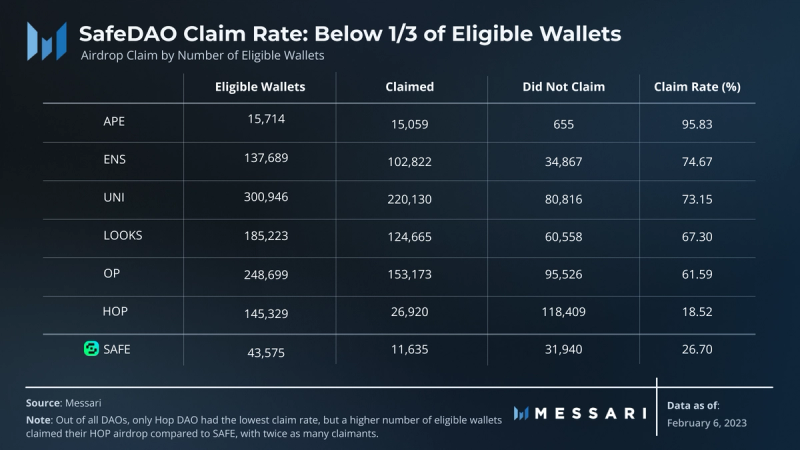
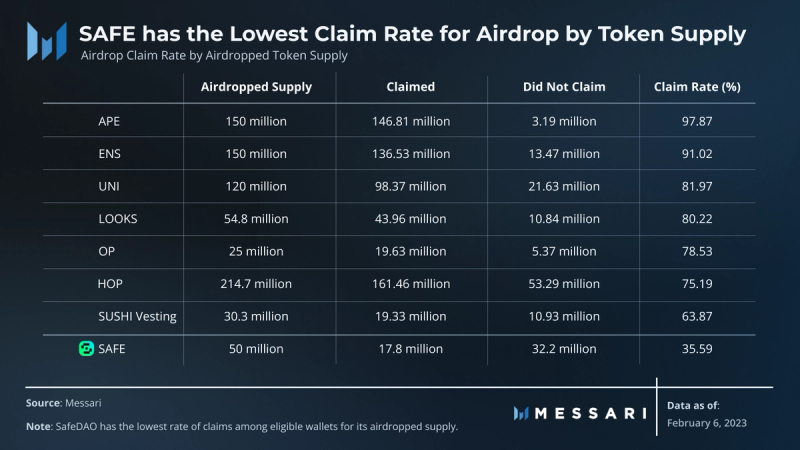
It is noteworthy that the difficulties of using Multi-signature wallets (Multisig) and the added security risks make it more challenging to claim airdrop tokens compared to Externally Owned Accounts (EOAs). This can help explain the lower rate at which SAFE tokens allocated to Safe users are being claimed.
Sentiments toward the Proposal options
Debate Over Allocating Unredeemed SAFE Tokens
The community is divided over the handling of unredeemed SAFE tokens, which would lead to further voting after SEP 5 to reach a consensus. Some members had suggested distributing the tokens to existing claimants and the rest to the Safe Grants initiative for developers who contribute to the ecosystem to reduce the influence of large wallets and close the voting power gap. However, others believe that many claimants are airdrop farmers, and they propose using on-chain governance participation as a criterion to identify and eliminate them.
Kdowlin stated that the initial airdrop of SAFE tokens had appropriate eligibility criteria that helped the project avoid airdrop farmers. Adam Hurwitz, a SafeDAO Guardian, supported this, stating that airdrop farmers had no expectations of receiving tokens because the cutoff period had already been defined. They agreed that airdropping active users during the claim period would identify real users who can increase engagement in SafeDAO.
To address concerns about this allocation, some members recommended opening another claim session to expand Safe’s community’s pool of token holders. They also support a broader airdrop to people who have participated in valuable governance-based votes and discussions, content creators, and educators. This last group could promote the ideals and developments of the SafeDAO and help counter the need for proper communication within the community. This is believed to open pathways for community contributions and allow people to earn the SAFE token through community initiatives such as the takebackownership campaign. Simultaneously, since SAFE is still non-transferable, it increases the likelihood of attracting long-term contributors who believe in its mission rather than short-term profit from the SAFE token sales.
Extension of Deadline for SAFE Token Claims
Extending the deadline for SAFE token claimants to receive their tokens is a topic of ongoing discussion. There are varying opinions on the extension length, with some supporting an indefinite extension but others arguing this would result in many unclaimed tokens. Some advocate for a short, limited extension to encourage token claims, while others suggest a longer extension. Possible options include redistributing unclaimed tokens to already claimed users, distributing a portion of the tokens to eligible addresses from the first drop, and returning a portion of the tokens to the SafeDAO treasury.
Many questions whether unclaimed tokens should be claimed or redistributed first. Some advocate extending the claim period before redistributions to promote long-term health and decentralize SafeDAO. However, others support distributing unclaimed tokens to only DAOs and view the three-month claim period as a way to screen interested participants. Particularly, Richard Meissner, Safe co-founder suggested handling the SAFE allocation the way the Optimism governance offers OP grants to projects that apply for a token allocation.
The 90-day redemption period for claims also posed a challenge, being shorter than other protocols’ claim periods and coinciding with holidays and year-end tax preparation. Additionally, approximately 50% of eligible wallets being created by the same owners may have impacted the poor claims and hindered the DAO’s goal of decentralization (expected Gini coefficient at 0.59 with total claims).
Expanding the Reach of SAFE Tokens
The original airdrop was confined to the Ethereum Mainnet due to technical complexity. It was deemed the most critical chain for SAFE and crucial to its popularity and trust. Nevertheless, some community members have proposed including Layer-2 (L2) users in the token redistribution. This would increase the number of SAFE holders and support active users who have already claimed tokens and those on alternative chains such as Gnosis Chain, BSC, and Polygon.
The proposal has encountered opposition that claims distributing tokens to every chain user is not practical, given that multiple-token holding by users on different chains exists. The proposed solution acknowledges the challenge of including L2 users in a manner that prevents Sybil attacks and seeks to keep the process straightforward to avoid delays. To account for these difficulties, the proposal should include options for exploring alternatives and a clear definition of its implementation. However, the final Snapshot vote will only reveal the results, not the reasoning behind each vote, making it challenging to gauge each voter’s preferences. This underscores the intricate decision-making process in DAOs.
Challenges of SafeDAO’s Voting System for Token Redistribution
SafeDAO’s current single-choice voting system poses a challenge to reaching a consensus. Single-choice voting produces a clear winner. Although simple, it also often underrepresents minority opinions. Theo Beutel suggests updating the system to include multiple voting options or making weighted voting the default method. By adopting a voting system that considers these nuances in complex governance decisions, SafeDAO can address more complicated issues and achieve a more representative outcome, possibly reducing consensus delays.
Conclusion
SafeDAO was created as a spin-off from Gnosis to decentralize product development through the SAFE token and give ownership to the community. Despite this, the SAFE token airdrop saw fewer claims compared to other DAO airdrops. This is believed to be due to insufficient communication leading to a lack of awareness, the inability to transfer the tokens, and the difficulty of redeeming the airdrop due to the complexity of DAOs and multisigs.
Extending the token redemption period is recommended to allow more community members to claim their tokens and participate in governance before redistribution. This will lead to a more balanced distribution of voting power, promoting the long-term success of SafeDAO. The token distribution significantly impacts SafeDAO’s governance, affecting elements such as the Safe Participation Agreement, the Safe DAO Constitution, and future resource allocation and control decisions. Understanding this impact is crucial for the stability and sustainability of SafeDAO.
—

